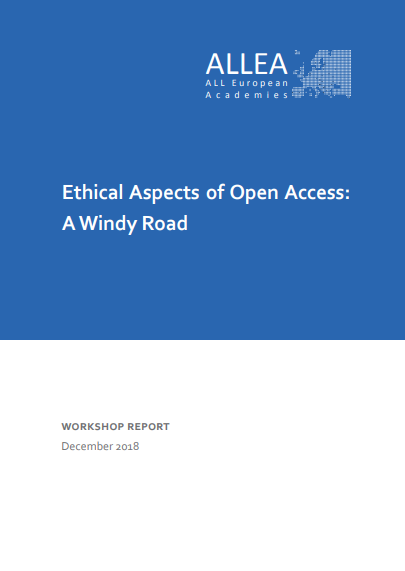THE ETHICAL ASPECTS OF OPEN ACCESS
Date: 1 February 2018 | Location: Academy Palace, Rue Ducale 1, 1000 Brussels
Organised by the ALLEA Permanent Working Group Science & Ethics and hosted by the Royal Flemish Academy of Belgium for Science and the Arts
About the workshop
Facilitating access to research is a shared interest of the academic community: Open Access enables researchers to present their results more easily, opens up opportunities for researchers and institutions who cannot afford to subscribe to scientific journals, and allows for an easier use of publications in the class room. But there are also unintended consequences. In some cases the costs have to be paid by individual researchers or institutions who cannot do so. Furthermore, it has led to an increase of predatory journals, retractions, and fake editors. How are these problems to be dealt with, or rather, how can the opportunities be maximized and the threats minimized? These questions were addressed at this workshop, which involved eminent experts from different parts of the world and from all relevant sectors involved in or affected by the on-going debate on open access publishing.
Presentations
Roger Pfister – Open Data in Science: Outcomes of the European Members of ICSU Workshop
László Fésüs – Open Access: The Problem Landscape from an Ethical Perspective
Chris Graf – Editorial Responsibility in the Open Access World: Best Practices
Stephan Lewandowsky – Open Data: Balancing Transparency with Resilience
Michele Garfinkel – Open Access and Assessing Research Performance
Background
After the 2003 Berlin declaration, organisations financing research increasingly require that the results of publicly funded research are published in open access form. Since then, the topic has been widely discussed and more recently was integrated into the Open Science agenda of the European Commission, where it sits alongside topics of Open Data and Open Source among others. Many of these issues were covered during a workshop on ‘Open Data in Science: Challenges and Opportunities in Europe’, organised by the European members of the International Council for Science in partnership with ALLEA on 31 January in Brussels.



